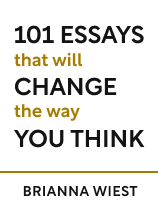

This article is an excerpt from the Shortform book guide to "101 Essays That Will Change the Way You Think" by Brianna Wiest. Shortform has the world's best summaries and analyses of books you should be reading.
Like this article? Sign up for a free trial here .
Do you tend to get upset when people don’t acknowledge or validate you? Do you often try to make other people happy at the expense of your own happiness?
When your sense of self-worth depends solely on the positive feedback you receive from others, you become dependent on external validation. Inevitably, you often fail to receive the feedback you want. And, each time you fail, you assume that it’s because you’re inadequate in some way—if other people don’t feel you deserve their positive feedback, then you won’t believe you deserve it.
Here’s how seeking validation from others impacts your self-esteem.
You Rely on External Validation to Feel Happy
In addition to influencing how you think about the world, social conditioning also influences the way you think and feel about yourself. According to Wiest, your feelings of comfort and happiness are so inextricably linked to how other people react to you that you feel compelled to think about yourself according to how you imagine other people perceive you. She explains it as follows:
- You subconsciously assume that your happiness depends on how other people react to you: When you get positive feedback, you evaluate yourself positively and this makes you happy. When you get negative feedback, you evaluate yourself negatively and this makes you unhappy.
- You only evaluate yourself positively when you believe that others think you deserve positive feedback and reward you accordingly. For example, if your teacher gives you a red cross, you don’t evaluate yourself positively and don’t feel happy, because your teacher thought you didn’t deserve a gold star. On the other hand, receiving a gold star makes you feel happy because it proves that your teacher is pleased with you.
- Because you want to be happy, you manipulate the way you project yourself to invite more positive feedback. This involves making yourself appear more pleasing or impressive—for example, by suppressing supposedly unappealing parts of your personality or chasing status goals to appear more accomplished.
External Validation and Self-Esteem
While it’s clear that seeking validation from others impacts your self-esteem, research on self-identity indicates that the feedback you receive from others is just one of four interrelated components that inform the way you think about yourself:
- Self-image: how you see yourself
- Ideal self: how you would like to be seen by others
- Real self: the feedback you receive from others that shows you who you really are.
- Looking-glass self: how you perceive the way others perceive you and compare it to the way you see yourself.
Further, the research shows that you’re more likely to have a healthy sense of self-esteem (how much you like and accept yourself) if your beliefs in each of the four components align with and complement each other.
In other words, the more your beliefs in each component clash with each other, the more likely you are to suffer from low self-esteem. For example, you see yourself as boring (your self-image) but you want others to see you as interesting (your ideal self). This gap between your self-image and your ideal self creates internal conflict and undermines your self-esteem.
It’s difficult to pinpoint the beliefs that inform your opinion of yourself in each of these areas. However, there are a number of tests you can take to discover what you really think about yourself—and to what extent external validation influences this opinion—such as The Rosenberg Self-Esteem Scale or The Flourishing Scale.

———End of Preview———
Like what you just read? Read the rest of the world's best book summary and analysis of Brianna Wiest's "101 Essays That Will Change the Way You Think" at Shortform .
Here's what you'll find in our full 101 Essays That Will Change the Way You Think summary :
- Why the only way to make yourself feel better is to change the way you think
- How social conditioning influences the way you unconsciously think
- How to manage your thoughts and feelings about yourself and your experiences






